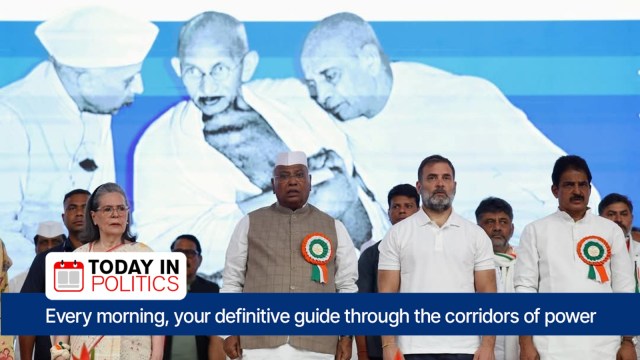Today in Politics: Congress revival plan; Sukhbir Badal back at Akali Dal helm
The Congress has now set out to overhaul its organisational structure, bringing key changes to its district committees and how they function.
 On Saturday, the Congress announced the names of the observers who are meant to oversee the changes and ensure smooth functioning of the DCCs in Gujarat. (Photo: X/@INCGujarat)
On Saturday, the Congress announced the names of the observers who are meant to oversee the changes and ensure smooth functioning of the DCCs in Gujarat. (Photo: X/@INCGujarat)There was a lesson for the Congress in its successive poll defeats: the importance of cadre on the ground.
In Haryana, it did not have a District Congress Committee (DCC) — the base unit of a party responsible for all outreach and campaign activities — for close to a decade. DCCs in other states were ridden with factionalism.
The Congress has now set out to overhaul its organisational structure, bringing key changes to its district committees and how they function. On Saturday, the Congress announced the names of the observers who are meant to oversee the changes and ensure smooth functioning of the DCCs in Gujarat. The list of the All India Congress Committee (AICC) observers for 41 DCCs in Gujarat include MPs Manickam Tagore, Praniti Shinde, Niraj Dange, Sukhdev Bhagat and Imran Masood as well as senior leaders like Balasaheb Thorat, BK Hariprasad, Harish Chaudhary, Meenakshi Natarajan, Girish Chodankar, Vijay Inder Singla, and Ajay Kumar Lallu.
The Badals back at the helm
Former Punjab Deputy Chief Minister Sukhbir Singh Badal was on Saturday re-elected as the Shiromani Akali Dal (SAD) president, a post that has been held by a member of the Badal family since 1990.
Held at the Teja Singh Samundari hall at the Shiromani Gurdwara Parbandhak Committee (SGPC) headquarters in Amritsar, the SAD president’s election was among several directions on its organisational changes issued by the Akal Takht – the highest temporal seat of Sikhs – after Badal and other SAD leaders were found guilty of “religious misconduct” during the Akali Dal-led government’s tenure from 2007 to 2017.
The 62-year-old Badal was subsequently forced to resign as the SAD president last December, which was accepted by the party’s Working Committee only in January this year.
Following the Akali Dal’s resounding defeat in the 2022 Assembly polls and its lacklustre performance in the 2024 Lok Sabha elections, Badal’s refusal to resign as president had resulted in many senior leaders leaving the party. With the party now largely comprising Badal’s loyalists, his re-election as the SAD president was a foregone conclusion.
When Badal first became the party president in 2008, under his father Parkash Singh Badal as the CM, the SAD had few challengers in Sikh politics. But now, with several Sikh groups emerging – from pro-Khalistan Amritpal Singh’s Akali Dal (Waris Punjab De) to the Akal Takht panel that was formed to reorganise the SAD – Badal is returning as the SAD president in a “do-or-die” situation.
Shah in Bhopal
When Mohan Yadav took charge as the Chief Minister of Madhya Pradesh in December 2023, he faced a daunting task of filling the shoes of Shivraj Singh Chouhan, the longest-serving CM of the state who had been eased out as the BJP looked to make a fresh start in the key Hindi heartland state.
Yadav went to work to take control of the state BJP and leave his imprint on both the party and the government. Almost a year-and-a-half later, in yet another decision that illustrates Yadav’s attempts to carve out a niche for himself and not be burdened by the legacy of Chouhan, now the Union Agriculture Minister, he recently renamed the CM Rise Schools in the state as Maharshi Sandipani Vidyalayas. While the move was not the first time Yadav was seen to be breaking from his predecessor’s legacy, it has raised questions in the state BJP.
Justifying his decision, Yadav on Wednesday said the previous name was “reminiscent of British-era institutions” and the schools were renamed after Rishi Sandipani, Lord Krishna’s guru, to “anchor the initiative in Indian traditions”.
The AICC now plans to set up a political affairs committee in each district. This committee is meant to include all the prominent party leaders of that district in the decision-making process. Through this, the party hopes to iron out differences that may potentially arise.
The party also wants to set up a panel — comprising one observer from the AICC and four leaders from the state Congress — for each district. The panel is expected to hold a workshop and seek inputs from district level leaders as well as senior state leaders. It will then sit down with candidates seeking to be district presidents. Party leaders said the idea is to pick the “most capable leader” as the district president.
The experiment’s pilot will be launched in Gujarat soon — and Saturday’s announcement for observers is a step in that process — and would be taken to other states depending on the outcome. The Congress says the entire process would take at least a year.
Photos



- 01
- 02
- 03
- 04
- 05




























